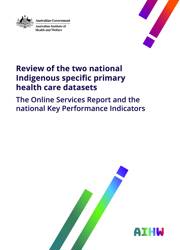Summary
The Commonwealth Department of Health (the Department) commissioned the Australian Institute of Health and Welfare (AIHW) to undertake a comprehensive review of the Online Services Report (OSR) and the National Key Performance Indicators (nKPIs). These collections are two of the main sources of data from health organisations funded to deliver primary health care services to Aboriginal and Torres Strait Islander Australians. This report summarises the outcomes of that review.
Purpose
The main objectives of the review were, for each collection, to:
- clarify their purpose and reporting requirements
- identify their strengths and weaknesses
- develop actionable options (recommendations) around how they can better meet the needs of key stakeholders (health services, peak bodies, funders, and policymakers) in the future, including providing options to:
- ensure better alignment and synergy between the two collections
- reduce reporting burden for health services
- improve the usefulness of the collections for key stakeholders.
Approach
The AIHW took a conceptually-based and collaborative approach to the review, based on the National Aboriginal and Torres Strait Islander Health Data Principles (AHMAC 2006). Engagement and consultation with a wide range of stakeholders through in-depth interviews, online surveys and national workshops was brought together with the findings from a policy and literature review to identify key issues and potential solutions.
Engagement with stakeholders was critical for the review, especially those who collect and report the data. In total, representatives from 131 different Indigenous-specific primary health care services (ISPHCS) that report to the OSR and/or the nKPIs participated in at least one of the three types of consultations. Participating services represented all types of services involved in the collections (community‑controlled, other non-government organisation (NGO), and government), as well as all remoteness areas.
Participants also included the National Aboriginal Community Controlled Health Organisation (NACCHO), the NACCHO Affiliates who support the community‑controlled ISPHCS, the Royal Australian College of General Practitioners (RACGP), 3 Government Departments, 2 national committees, and 4 software vendors.
The review focused on five themes for each collection—purpose, usefulness, content, reporting burden, and ways forward.
Key findings
In general, while participants acknowledged the importance of both collections for national reporting and policy development, the review found that:
- there could be more clarity around the purpose of the collections
- there was variation in the extent to which different stakeholders found the collections useful
- improvements could be made to the content of the collections, including revising items in the OSR to better reflect what ISPHCSs do, and ensuring the nKPIs (as individual indicators and as a set) maintain their relevance and continue to meet current clinical and best practice guidelines
- the burden of reporting could be reduced, for example, by streamlining the OSR collection instrument, and improving training material for clinical information systems (CIS).
While the focus of the review was on the individual aspects of each collection, it also identified a number of broader themes which applied to both collections, including:
- the importance of high quality and meaningful data for the improvement of health services and health outcomes for Aboriginal and Torres Strait Islander Australians at both the service and policy levels
- the need to view the OSR and nKPIs in context of the broader environment in which they operate, and considering them as related collections rather than in isolation
- the impact of reporting requirements outside of the OSR and nKPIs which add to overall reporting burden for the health services
- the need for a clearer and more inclusive data development process, recognising that such a process helps to ensure that the data collected benefit a wider range of stakeholders
- the desire to strengthen governance arrangements.
The recommendations in this report are designed to be a starting point for further discussions. Such discussions must be based around appropriate data development principles and will need to consider the implications, impacts and costs of the recommendations versus the benefits of changing the collections.
1 Introduction
- Background
- Purpose and scope of the review
- Approach
- Analysis and development of recommendations
2 Overarching key findings
- High-level themes
3 Synthesis and recommendations—OSR
- Collection overview
- Findings and recommendations by theme
- Implementing the recommendations
4 Synthesis and recommendations—nKPIs
- Collection overview
- Findings and recommendations by theme
- Implementing the recommendations
5 Data governance and data development
- Data governance
- Creating a single Indigenous-specific primary health care dataset for analysis and reporting
- Data development approach
6 Progress since the review
- Current status of the redevelopment of the OSR
- Impact of the move to the HDP
- Data quality and technical issues
- Key priorities for moving forward
Appendixes:
Appendix 1: Detailed overview of consultation methodology
Appendix 2: History of the OSR
Appendix 3: History of the nKPIs
Appendix 4: List of indicators in the nKPIs
Appendix 5: Summary of OSR uses and issues identified in the review
Appendix 6: Initial feedback on OSR redevelopment (2018)
Appendix 7: Possible OSR restructure (2018)
End matter: Abbreviations; Acknowledgements; References; List of tables; List of figures



